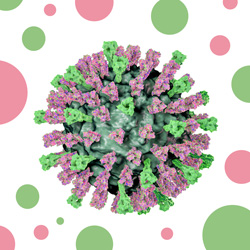
If you pay attention to the news at all, you're probably aware that measles is making a comeback—and it's more than just a rash.
Measles is a respiratory illness caused by one of the most contagious viruses in the world. It spreads through coughs and sneezes. You can get the virus just from being in a room where an infected person has been.
If someone is infected with measles, they'll typically get symptoms a week or two later. It usually starts with:
• A high fever.
• A runny nose.
• A cough.
• Red, watery eyes.
A few days later, tiny white spots may appear in the mouth, followed by an uncomfortable facial rash that spreads to the body. People who have measles can spread the virus to others four days before and four days after this rash appears.
Some people think that measles isn't a big deal, but it can cause serious health problems—like pneumonia and brain swelling—especially in children younger than 5 years. In some cases, people can die from measles.
Measles was eliminated in the U.S. in 2000, thanks to vaccinations. However, a decline in measles vaccination rates is one of the reasons it's showing up again. Measles also exists around the world, which means it can be brought into this country through international travel. The virus spreads quickly among people who have not been vaccinated, causing an outbreak.
Preventing measles
The best way to protect your family and your community from measles is with vaccinations. The MMR (measles, mumps and rubella) vaccine is 97% effective against measles. Children need two doses—the first at 12 to 15 months of age and the second at 4 to 6 years.
Another vaccine option, for children ages 12 months to 12 years, is the MMRV (measles, mumps, rubella and varicella) vaccine, which also protects against chickenpox.
Older children and adults can also get a measles vaccine if they don't have evidence of immunity, such as a previous vaccination record or a confirmed measles infection in the past. People born before 1957 are usually immune to measles because of prior infection.
If you're planning to travel abroad, ask your doctor if you need a measles vaccine.
Sources: American Academy of Family Physicians; Centers for Disease Control and Prevention